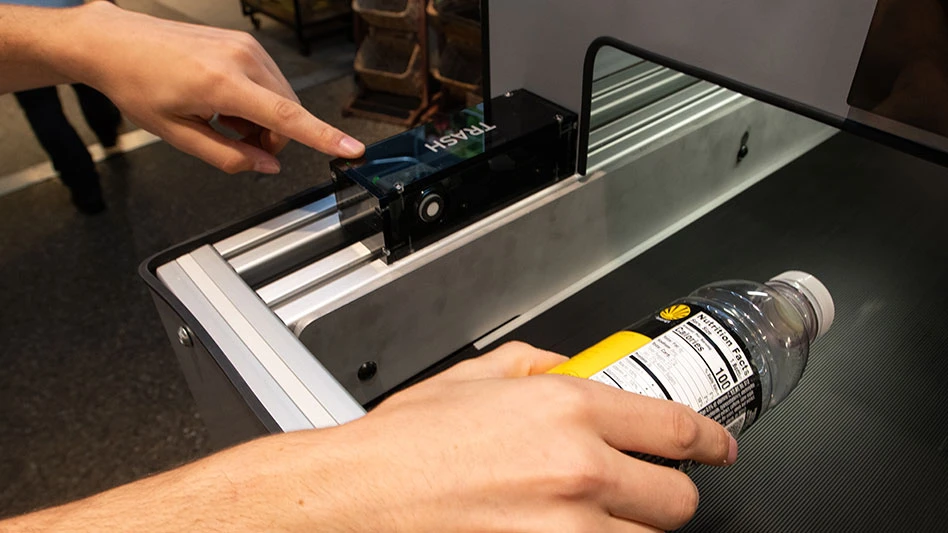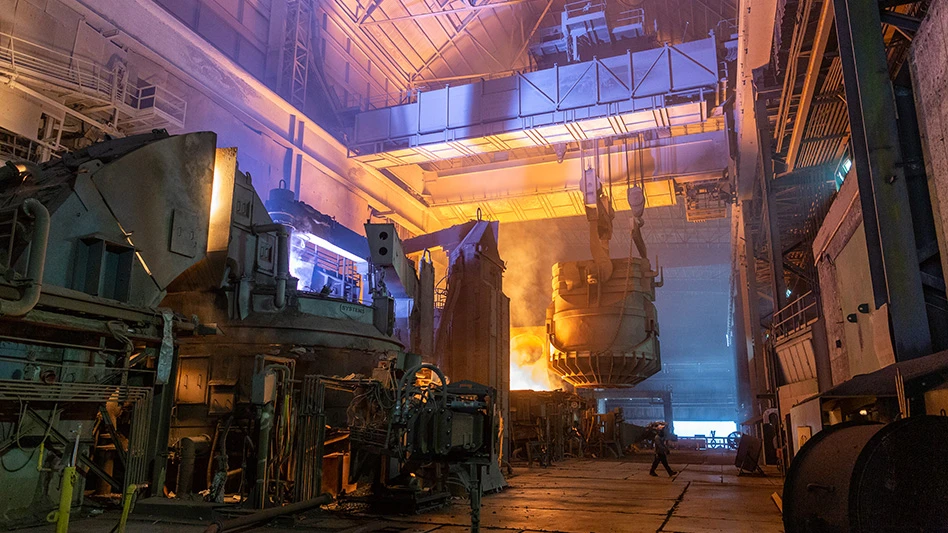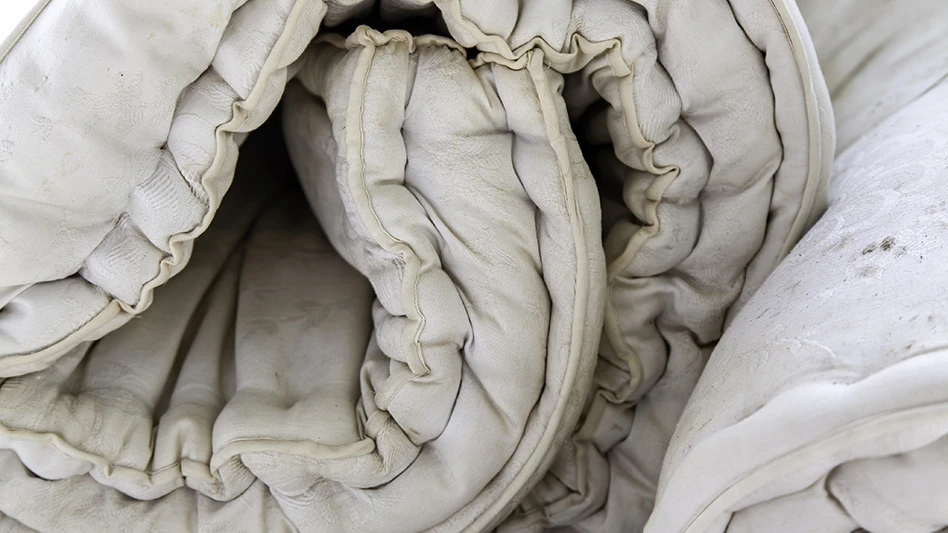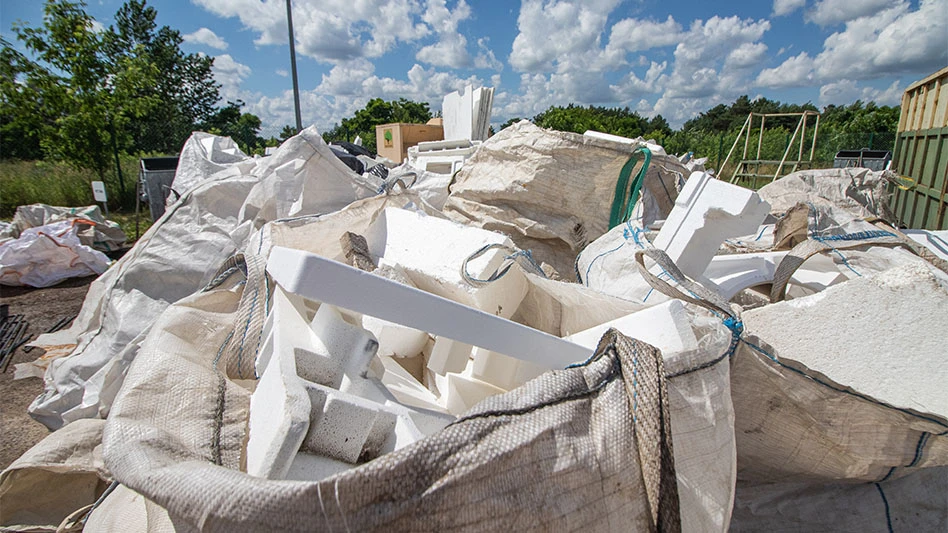
Photo courtesy of UMass Amherst
A robotics company focused on waste management and recycling is rolling out a pilot program with UMass Dining Services to test the ability of its artificial intelligence (AI) to identify in real-time the material in the waste stream.
Ian Goodine and Ethan Walko, rStream founders, will present their technology, dubbed AuditPRO, Oct. 17 during an invite-only session at 4:30 in the UPub. However, members of the press and the community can join a demonstration at 5:30 p.m. in the Lincoln Campus Center.
Goodine and Walko began investigating solutions for waste in 2020 during their mechanical engineering senior design project at UMass Amherst. During their master’s studies, they formally co-founded rStream, further developed the idea through the I-Corps @ UMass program of the Institute of Applied Life Sciences, which helps students and others on campus turn their technological discoveries into real-world products and services, and sought out grant funding from the National Science Foundation to support their continued R&D.
“The big problem in recycling is people just don’t put stuff in the right bin,” Goodine says. This often leads to capture rates of only 30 percent and contamination in recycling bins.
The computer vision and robotic innovations in rStream’s technology will take the guesswork away from consumers, according to a news release from UMass Amherst.
“The world rStream wants to make is one where consumers put everything in a single bin and automation does the rest,” Goodine says. “Instead of 30 percent, this technology could ensure 90 to 100 percent of recyclables are being picked up by waste haulers and made into new products.”
The current pilot, the AuditPRO (pilot readiness optimization), is at the UMass Amherst Lincoln Campus Center concourse.
“It tests rStream’s artificial intelligence and will identify in real time what goes into the waste stream. These data reports will provide feedback to the sustainability team at UMass which can be used to inform waste reduction efforts,” Walko adds.
“Making robotics to sort waste is the end goal,” Goodine says. “But developing a robot for this task is an exceptional R&D effort. RStream is deploying this auditing system to accelerate our research into real-world settings and prove that we’ve developed a state-of-the-art AI ‘brain’ for our robot.”
Kathy Wicks, sustainability director of Auxiliary Enterprises, says that even without the robotic component, the AI auditing system is extremely valuable. She has been working with Goodine and Walko since they first had the idea as undergraduates.
“Currently, and historically, waste audits have been messy and cumbersome. They consist of emptying out a dumpster and sorting it. And UMass has done that,” she adds.
Data from waste audits are used to drive the university’s decisions on how to handle waste and what future green initiatives are needed.
“The beauty of the AuditPRO system is that it’s happening in real time, and it happens without the mess, the labor or the space,” Wicks adds.
Walko says, “Understanding the waste outputs of UMass, especially those products which may be harder to dispose of sustainably, will make UMass Sustainability agile as they optimize their program. A common solution may be targeted communications, but it will go as deep as advising strategic procurement to have more sustainable outputs from campus operations.”
While we aspire to create a circular economy, the consumer is a key driver. “Our performance at the waste bins heavily determines the economic viability of a circular economy, and humanity has a bad track record with that,” Goodine says. “We’re making a bet that robotics can decrease the anxiety around waste decisions and outperform other strategies.”
RStream has received a $275,000 National Science Foundation Small Business Innovation Research (SBIR) grant as well as $125,000 from the Massachusetts Clean Energy Center’s AmplifyMass program.
The startup is in the cleantech incubator, Greentown Labs, in Somerville, Massachusetts.
Latest from Recycling Today
- Alpla calls 2024 year of recycling growth
- Altilium says agreement puts it on lithium recycling path
- NWRA, SWANA partner to address lithium-ion batteries
- Corinth, Texas, renews waste contract with CWD
- Fresh Perspective: Sarah Zwilsky
- Plastics Industry Association announces leadership changes
- QCC celebrates 50th anniversary
- Venture Metals acquires 2 nonferrous processors





